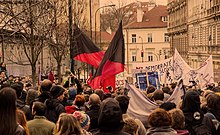Anarchism in the Czech Republic
It later dissolved into the nascent Czech communist movement, before seeing a resurgence after the fall of the Fourth Czechoslovak Republic in the Velvet Revolution.
The Hussites, inspired by the teachings of Jan Hus, held that all authority (including the Church) was unjustifiable because it did not follow God's laws.
Although the revolutionary Tábor did establish consumer communism in its beginnings,[1] the authorities were not suppressed (on the contrary, Jan Žižka imposed an authoritative military order).
Adamites and other followers of folk radicalism (historian Vladimír Liška refers to them as the "far left" of the movement[2]) were gradually eliminated by the Hussites.
As an early pacifist, Chelčický is considered to be a forerunner of Christian anarchism and anarcho-pacifism, his teachings were an influence on Leo Tolstoy.
"[1] The emergence of the anarchist movement in Bohemia and Moravia was closely connected with the split in the Czech Social Democratic Party.
Many anarchists, especially Bohuslav Vrbenský and the union leaders of North Bohemian miners, established closer cooperation with representatives of the Czech National Social Party (ČSNS).
In February 1919, the liquidation congress of the Federation of Czech Communist Anarchists (FČAK) took place, which agreed to merge with the ČSNS.

